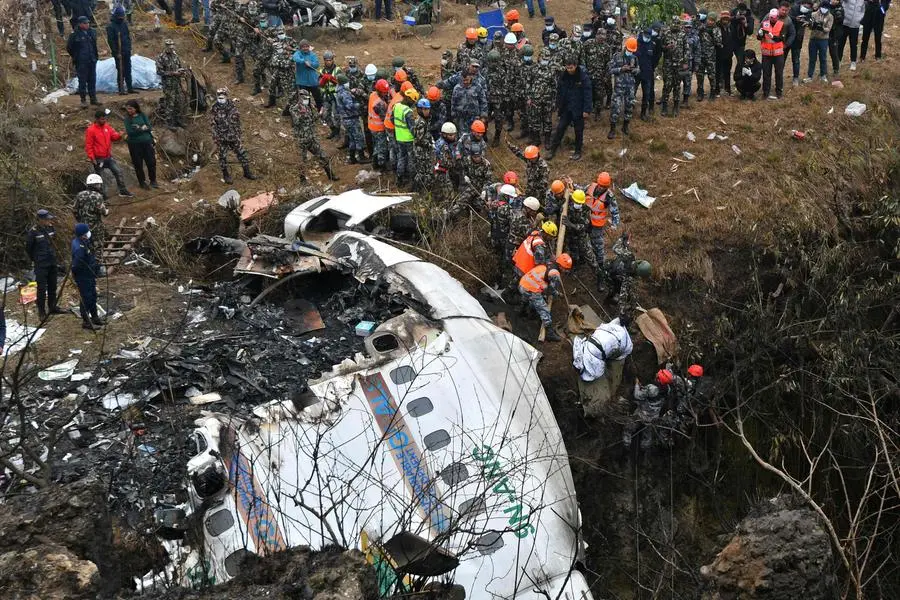PHOTO
Nepali rescue workers scoured a debris-strewn ravine Monday for four missing bodies from the mangled wreckage of a plane that crashed with 72 people on board, with hopes of any survivors now "nil", according to authorities.
The Yeti Airlines ATR 72 plummeted into the steep gorge, smashed into pieces and burst into flames as it approached the central city of Pokhara on Sunday morning, in Nepal's worst aviation disaster since 1992.
The cause of the crash was not yet known but a video on social media -- verified by AFP partner ESN -- showed the twin-propeller aircraft banking suddenly and sharply to the left as it approached Pokhara airport. A loud explosion followed.
Nepal, which has a poor record on air safety, observed a day of mourning on Monday for the victims.
Soldiers used ropes and stretchers to retrieve bodies from the 300-metre (1,000-foot) deep ravine late into the night, with recovery efforts resuming on Monday.
"We have collected 68 bodies so far. We are searching for four more bodies. We should continue until we get the bodies," senior local official Tek Bahadur KC told AFP.
"We pray for a miracle. But, the hope of finding anyone alive is nil," he said.
Debris from the airliner was strewn across the crash site, including the mangled remains of passenger seats and the plane's white-coloured fuselage.
'In pain'
Raj Dhungana, the uncle of one of the 68 passengers, 23-year-old Sangita Shahi, told AFP outside a hospital in Pokhara that his whole family "is in pain".
He described a "very talented" young woman who was a student in Kathmandu, and also ran a makeup studio and worked on an online business platform on the side.
"God has taken away such a nice person," he said.
The passenger manifest included five Indians, four Russians, two South Koreans, and one person each from Argentina, Australia, France and Ireland. The rest were Nepalis.
"Incredibly sad news," Australian Prime Minister Anthony Albanese tweeted. Indian premier Narendra Modi also expressed his condolences.
The ATR 72 was on a flight from the capital Kathmandu and hit the ground between Pokhara's brand-new international airport and the old domestic one shortly before 11:00 am (0515 GMT) on Sunday.
"I was walking when I heard a loud blast, like a bomb went off," said witness Arun Tamu, 44, who was around 500 metres away and who live-streamed video of the blazing wreckage on social media.
"A few of us rushed to see if we can rescue anybody. I saw at least two women were breathing. The fire was getting very intense and it made it difficult for us to approach closer," the former soldier told AFP.
It was unclear if anyone on the ground was injured.
Aviation expert Greg Waldon told AFP that, from the video shared on social media, it appeared the plane may have had a "wing stall", meaning one wing suddenly stopped providing lift.
"When you're at low altitude and you have an event like that... it's major trouble," Waldon, Asia managing editor at industry publication FlightGlobal, told AFP.
France-based manufacturer ATR said in a statement on Sunday that its "specialists are fully engaged to support both the investigation and the customer".
Nepal's air industry has boomed in recent years, carrying goods and people between hard-to-reach areas, as well as ferrying foreign mountain climbers.
Yeti Airlines, Nepal's second-biggest carrier, was founded in 1998 by entrepreneur Ang Tshering Sherpa, who died in a helicopter crash in 2019.
The aviation sector has been plagued by poor safety due to insufficient training and maintenance. The European Union has banned all Nepali carriers from its airspace over safety concerns.
Nepal also has some of the world's most remote and trickiest runways, flanked by snow-capped peaks with difficult approaches and capricious weather.
The country's deadliest aviation accident took place in 1992, when all 167 people on a Pakistan International Airlines jet died when it crashed on approach to Kathmandu.





















